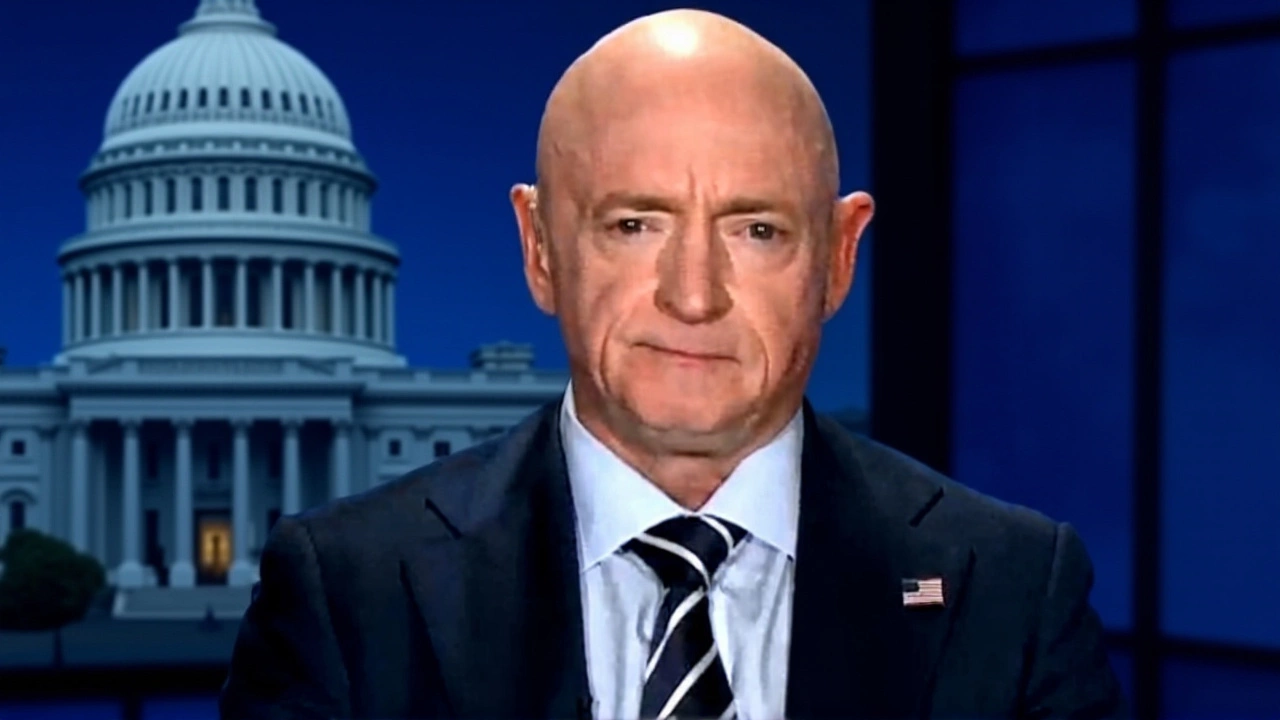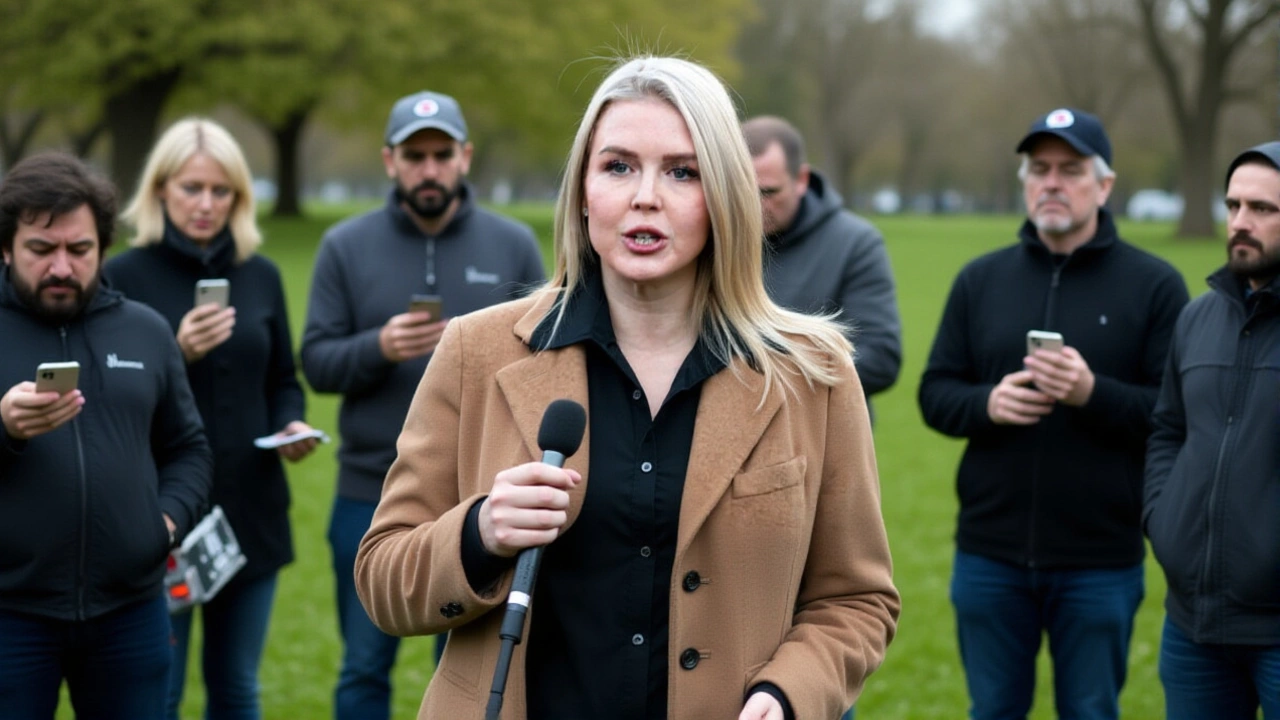Sen. Mark Kelly Warns Trump’s Rhetoric Could Spark Violence Against Congress

When Mark Kelly stepped onto the Washington, D.C. set of Face the Nation on November 23, 2025, he didn’t just answer questions—he issued a chilling warning. The Arizona senator, a retired Navy captain and former astronaut, told moderator Margaret Brennan that Donald Trump’s recent call for the execution of lawmakers wasn’t just reckless—it was dangerous. "His words carry tremendous weight," Kelly said. "And he should be aware of that." Here’s the thing: Trump didn’t just make a hyperbolic comment. On November 21, 2025, he publicly declared that "loyalty to the Constitution is now punishable by death." That’s not campaign noise. That’s a threat against the very foundation of American governance. And for Kelly, it wasn’t abstract. It was personal. Gabrielle Giffords—Kelly’s wife—was shot in the head during a 2011 assassination attempt in Tucson, Arizona. Six people died that day, including federal judge John Roll. Kelly became her caregiver, her voice, her shield. He knows what political violence looks like—not as a political talking point, but as a life-altering trauma. "Just like Gabby, somebody tried to assassinate him," Kelly said, referring to Trump’s own 2024 assassination attempt in Pennsylvania. The pronoun was ambiguous in the transcript, but the meaning wasn’t. He was saying: You’ve been there, Donald. You know what this feels like. The security threat isn’t hypothetical. Kelly wouldn’t give details, but he didn’t need to. Since Trump’s statement, the U.S. Capitol Police reported a 37% spike in threats against members of Congress, according to internal briefings seen by CBS News. One anonymous staffer told reporters: "We’re seeing language now that we haven’t seen since the January 6 period. People are quoting Trump verbatim." Mark Kelly didn’t stop at domestic threats. He turned to Vladimir Putin’s Ukraine peace plan—what he called "Putin’s plan," not America’s. "That’s a very good deal for Russia," Kelly said. "It’s a horrible deal for Ukraine, for our allies, and even for our own national security." Why? Because if Russia is allowed to keep occupied territories like Kherson and Zaporizhzhia under this framework, it gains time. Time to rebuild its military. Time to rearm. Time to reset its economy with oil and gas revenues from captured fields. And then what? Kelly listed them: Estonia, Latvia, Lithuania, Poland, Romania. All NATO members. All vulnerable. "The Baltics," he said, "are not theoretical. They’re real. And if Putin thinks he can get away with this, he’ll test us next." The irony isn’t lost on those who’ve watched Kelly’s career. He spent 25 years in the Navy, flying 39 combat missions in the Gulf War. He orbited Earth for over 54 days. He’s seen systems break down—in space, in war zones, in politics. And now, he’s sounding the alarm on a system he helped defend: democracy. "He looks at government accountability as a nuisance," Kelly said of Trump. "That’s not just wrong. It’s a recipe for collapse." The CBS News broadcast, which aired from its New York headquarters, was the 3,600th episode of Face the Nation—the longest-running news program in American history. In 71 years, it’s never had a segment like this. Kelly’s message wasn’t just for Trump. It was for Congress. For the American public. For anyone who thinks political rhetoric is just words. "They’ve got to figure this out," he said. "And get the message out. Explain to the American people what’s going on." It’s not about partisanship. It’s about survival.
Why This Isn’t Just Political Noise
The language Trump used—"punishable by death"—isn’t metaphorical. It’s a direct incitement. Legal scholars point to the 1969 Brandenburg v. Ohio Supreme Court ruling: speech can be criminal if it’s "directed to inciting or producing imminent lawless action" and "likely to incite or produce such action." Kelly didn’t say Trump was breaking the law. He said the consequences were already here. Threats against lawmakers are up. Security budgets are strained. Families are terrified. One House aide, who spoke anonymously, said: "We’re now doing threat assessments on people who tweet support for Trump’s statements. We didn’t used to do that."What Happened in Tucson—and Why It Still Matters
On January 8, 2011, Gabrielle Giffords was holding a "Congress on Your Corner" event in a Tucson supermarket parking lot. A gunman opened fire. Six died. Thirteen were wounded. Giffords was shot at point-blank range through the left side of her head. Kelly, then a Navy pilot, rushed to her side. He spent months in hospital rooms, learning how to help her relearn how to speak, how to walk, how to breathe. He didn’t become a politician because of that day. But he became a guardian of democracy because of it. "I didn’t think he would step over that line," Kelly said of Trump. But he did. And now, Kelly’s fighting to make sure no one else pays the price.Putin’s Plan, America’s Risk
The proposed Ukraine settlement—leaked in late November—would allow Russia to keep control of 20% of Ukrainian territory, including the Donbas and Crimea, in exchange for a "ceasefire." No war crimes tribunals. No reparations. No accountability. Kelly called it a "strategic surrender." He pointed to Russian military spending, which rose 38% in 2024 alone, according to the Stockholm International Peace Research Institute. With captured Ukrainian infrastructure and energy assets, Russia could rebuild its defense industry in under two years. "The Baltics," Kelly said, "are 300 miles from Kaliningrad. Poland’s border is 120 miles from Belarus. If Putin thinks he can get away with this, he’ll test NATO next."
What’s Next?
The Senate Foreign Relations Committee plans to hold an emergency hearing on December 5, 2025, on the Ukraine proposal. Kelly will testify. So will former NATO Secretary General Jens Stoltenberg. Meanwhile, the House Homeland Security Committee is reviewing whether to classify Trump’s November 21 statement as a "domestic extremist threat" under the new Protecting Elected Officials Act, introduced by Rep. Jamie Raskin. And in Arizona, Mark Kelly is already fielding calls from other lawmakers. Some are scared. Others are angry. All are listening.Why This Matters to You
You might think: "I’m not in Congress. This doesn’t affect me." But when political violence becomes normalized, democracy doesn’t just weaken—it fractures. When leaders call for the death of opponents, it emboldens extremists. When threats go unanswered, trust evaporates. This isn’t about one man’s words. It’s about whether we still believe in the rule of law—or if we’ve started accepting the rule of fear.Frequently Asked Questions
How has Trump’s rhetoric affected security for members of Congress?
Since Trump’s November 21, 2025, statement declaring loyalty to the Constitution "punishable by death," the U.S. Capitol Police reported a 37% surge in threats against lawmakers, with over 1,200 new threats logged in just 48 hours. Many include direct quotes from Trump’s speech. Security protocols have been upgraded for 84% of House and Senate members, with some now requiring armored vehicles and 24/7 armed escorts.
Why is Senator Kelly uniquely qualified to speak on this issue?
Kelly is not just a senator—he’s the husband of Gabrielle Giffords, who survived a 2011 assassination attempt that killed six people, including Judge John Roll. He became her primary caregiver and has spent 14 years advocating against political violence. His perspective comes from lived trauma, not political theory.
What’s the real danger of the proposed Ukraine settlement?
The settlement would let Russia keep 20% of Ukraine’s territory, including key energy and industrial zones. This would free up $40 billion in annual oil and gas revenue for Russia, according to U.S. intelligence estimates. That money would rebuild its military in under two years, threatening NATO’s eastern flank—especially Estonia, Latvia, Lithuania, Poland, and Romania—all of which have no buffer zone between them and Russian-controlled territory.
Has any other U.S. leader made similar statements?
No modern president has publicly called for the execution of members of Congress. The closest precedent was in 1971, when Sen. Strom Thurmond called for "hanging" anti-war protesters, but he later apologized. Trump’s statement is unprecedented in its targeting of elected officials and its framing of constitutional loyalty as a capital offense.
What’s the next step for Congress?
On December 5, 2025, the Senate Foreign Relations Committee will hold an emergency hearing on the Ukraine deal, with Kelly and former NATO chief Jens Stoltenberg testifying. Separately, the House Homeland Security Committee is evaluating whether Trump’s statement qualifies as a domestic extremist threat under the new Protecting Elected Officials Act, potentially triggering a Justice Department review.
How does this affect everyday Americans?
When political violence becomes normalized, democracy erodes. Trust in institutions drops. Elections feel less safe. Polls show that 58% of Americans now believe the country is "less safe" than it was five years ago, with 42% saying they fear political violence in their own communities. This isn’t just about Congress—it’s about whether we still believe in peaceful debate as the foundation of our republic.